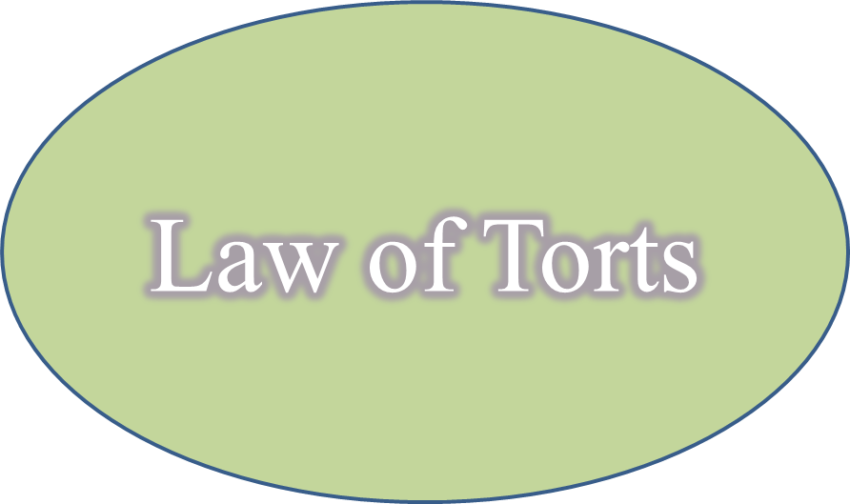Easy Notes Law of Torts
Law of Torts is a civil substantive law
Substantive law – Substantive laws determine the legal relationship between different individuals, or between individuals and the State. It signifies the rights, duties and liabilities of individuals.
“In common sense the law of torts is the branch of law controlling the behaviour of the people in society. It is a growing branch of law and it’s main aim is to define individual’s right and duties in the light of prevalent standards of reasonable conduct and public convenience.
The principal aim of the law of torts is for providing compensation to victims or their dependants.
This branch of law has attained great importance in England and other Western countries, though not to the same extent in India.”[1]
Origin and Development
The term ‘Tort’ is the French equivalent of the English word ‘wrong’ and Roman term ‘delict’. ‘Tort’ is derived from the Latin ‘Tortum’ meaning ‘twisted’ or a ‘crooked’ act, i.e., a deviation from straight or right conduct.
In this generic sense it was introduced into the terminology of the English law but it was an obscure term till the middle of the seventeeth century.
Till that time procedure was considered more important than the right. There were certain recognized forms (royal writ) of action for providing remedy for wrongful conduct.
An action was commenced through a royal writ (form). These writs were issued from a special department of government known as officina brevium (or writ shop). The plaintiff had to choose the correct or appropriate writ and pay for it. if he purchased a wrong writ or he could not fit his claim in one of the recognised forms of action, his suit was dismissed. The rule was ubi remedium ibi jus, i.e., where there was no writ there was no right.
The writs which remedied the injuries now known as torts were at first the ‘writ of tresspass’. The writ of trespass lay for direct and immediate injury to land, goods or person. It did not extend to indirect or consequential injuries.
Remedy for these indirect or consequential injuries lay in writ of tresspass on the case.
These forms (writ) of action were abolished by the Common Law Procedure Act 1852, the Judicature Act of 1872 and the rules made thereunder in 1875. Every pleading was required to contain only a statement in a summary form of the relevant facts on which the party pleading relied.
Thus, we find the primacy of substance over procedure. Today the maxim is ‘ubi jus ibi remedium’ i.e. where there is right there must be a remedy.
Other forms of harm later became redressible, e.g., libel and slander, and distinct forms of action developed to redress particular kinds of harm,
So that the law of tort was concerned with a number of recognized kinds of wrong, each with distinct requirements and procedure, statute did new entitlements to claim easy in cases of Federal accident and new ground of liability.
Case- law has extended liability,
e.g., from physical injuries to mental injuries, and from intentional harms to harms done negligently, i.e., by failure to show the standard of precautions deemed necessary in the circumstances.
It remains the case, however, that the law of tort is a collection of circumstances in which the court will give a remedy, normally by way of damages, for legally unjustified harm or injury done by one person to another rather than a general principle of liability applicable to manifold cases.
Some parts of the law of tort in India have been enacted as follows:
- The Fatal Accident Act, 1855
- The Carriers Act, 1865
- The Specific Relief Act, 1963
- The Easements Act, 1882
- The Workmen Compensation Act, 1923
- The Patent and Designs Act, 1911
- The Sale of Goods Act, 1930
- The Motor Vehicle Act, 1988
Nature & Definitions of tort
The word tort has been derived from the Latin term ‘tortum’, which means ‘to twist’. Thus, tort means “a conduct which is not straight or lawful, but on the other hand twisted,crooked or unlawful.” It is equivalent to the English term ‘wrong’.
According to Winfield –
“Tortious liability arises from the breach of a duty primarily fixed by law; this duty is towards persons generally and its breach is redressible by an action or unliquidated damages.”
According to Salmond –
“It is a civil wrong for which the remedy is a common-law action for unliquidated damages and which is not exclusively the breach of a contract or the breach of a trust or other merely equitable obligation.”
According to Underhills –
“An act or omission which, independent of contract, is unauthorized by law, and results either in the infringement of some absolute right to which another is entitled, or in the infliction upon him of some substantial loss of money, health, or material comfort, beyond that suffered by the rest of the public, and which infringement or infliction of loss is remediable by an action for damages.”
According to Pollock –
“Tort is an act or omission (not merely the breach of a duty arising out of personal relations, or undertaken by a contract which is related to harm suffered by a determinate person, giving rise to a civil remedy which is not an action of contract.”
According to Section 2(m), the Limitation Act, 1963 –
“Tort means a civil wrong which is not exclusively a breach of contract or breach of trust”
According to Fraser –
“It is an infringement of a right in rem of a private individual giving a right of compensation at the suit of the injured party.”
Deriving from the above discussion, tort may be defined as “a civil wrong that is redressible by an action for unliquidated damages. Additionally, tort covers a civil wrong which is other than a mere breach of contract or breach.”
- Tort is Civil Wrong
- This civil wrong is other than mere of contract or breach of trust
- Tort is redressible by an action for unliquidated damages
Characteristics of the Tort – Concept
- A law of tort is a law relating to the violation of a person’s rights. Under special circumstances, rights and duties arise between individuals according to the common law. The infringement of these duties and rights is called tort.
- A tort is different from unfair acts that are wholly subject to breach of contract.
- Remedy of the tort can be obtained by filing a suit for damages in the civil court.
- Both tort and crime are different.
- Tortious Liability is against all the people of the society, so every person of the society is obliged not to do the wrongdoing. It is a public right (Right in Rem).
- The main aim is to re- compensate the plaintiff for the loss suffered by him
- Tort is always redressible by an action for unliquidated damages
Difference between tort and Crime
| Tort | Crime |
| Tort is an infringement of private or civil rights of individual. | while crime is a breach of public rights which affect the whole community. |
| The forum of redressal is civil court in the matter of tort. | while proceedings are to be initiated in a criminal court in a crime. |
| The suit for damages is filed in the Civil Court against the wrongdoers by the plaintiff himself in tort | while proceedings are initiated against the accused by the state in crime. |
| The main aim is to re – compensate the plaintiff for the loss suffered by him from the wrongful act of the defendant in tort | while the main aim is to punish the accused if convicted to set example such crime is not repeated in future in crime. |
Difference between tort and breach of contract
| Tort | Contract |
| There is a breach of duty which is fixed by law in tort | while there is a breach of Duty which is fixed by the contracting parties in contract. |
| Motive for breach of duty is immaterial in tort | while motive for breach of contract is often taken into consideration. |
| There is a violation of a right in rem i.e., a right vested in some determinate person and available against the whole world in tort | while A breach of contract is an infringement of a right in personam i.e., a right available only to a /some definite person and in which society has no concern in contract. |
| Damages are generally unliquidated and are determined by the court on the facts and circumstances of the case in tort | while damages are fixed according to the terms and conditions of contract. |
Difference between tort and breach of trust
| Tort | Trust |
| Damages are unliquidated in tort | while Damages may be liquidated as well as unliquidated in trust |
| There doesn’t exit a relationship like trust | While There exist a relationship of trustee and beneficiary between the two in trust |
| 3. Tort is not a breach of law of property | Trust is a breach of law of property while tort is not |
[1] Shukla M. N., The Law of Torts & Consumer Protection Act And Compensation Under Motor Vehicle Act, Central Law Agency, 21st edition

